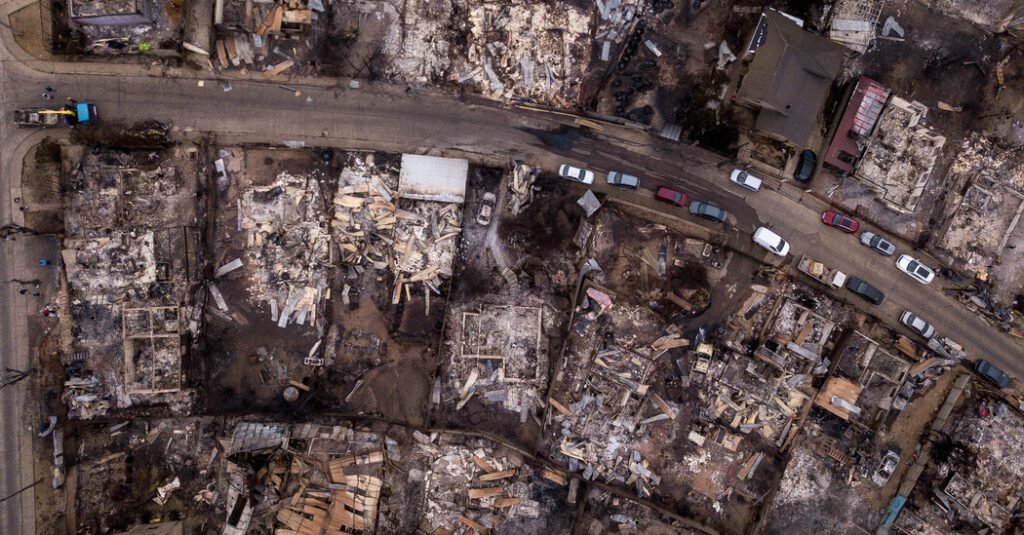Days after devastating wildfires swept Chile’s Pacific coast, officials said Sunday that at least 64 people had been killed and hundreds were still missing, and warned that the death toll could rise exponentially.
“This number will increase, we know it will increase significantly,” President Gabriel Boric said Sunday, describing the fires in the Valparaiso region as the country’s worst disaster since the devastating 2010 earthquake that killed more than 400 people. dead and displaced 1.5 million.
Thousands of homes have been destroyed by the fires, which have swept the coastal hills towards the resort of Viña del Mar since Friday, fanned by strong winds.
The fires came as many were vacationing in Viña del Mar and roared through hillside settlements where many elderly residents were unable to escape.
Omar Castro Vázquez, whose house was destroyed in the El Olivar settlement, said an 80-year-old neighbor died in the fire.
“It was more like a nuclear bomb than a fire,” Mr. Castro, 72, said. “There’s nothing left.”
The devastation in Valparaiso comes as dozens of wildfires burn across central and southern Chile amid what officials say are warmer-than-normal temperatures for this time of year.
Several other countries in South America also struggled to contain the fires. In Colombia, fires have broken out in several parts of the country in recent weeks, including the capital Bogota, amid dry weather.
Firefighters are battling the flames in Ecuador, Venezuela and Argentina.
The cyclical climate phenomenon known as El Niño has caused droughts and high temperatures in parts of the continent, creating conditions that experts say are ripe for wildfires.
By early Sunday morning, wisps of smoke clung to the hillsides above Viña del Mar. Along the highway to the coast, embankments and bridges were charred and tree stumps simmered on hillsides. The charred husks of cars littered the streets.
Early signs point to faulty evacuation orders, which some residents said may have contributed to the death toll.
Photos posted on X, the social platform formerly known as Twitter, showed long lines of burning cars that appeared to be engulfed in flames as people tried to leave, drawing comparisons to the failed evacuation during last year’s Lahaina fire in Maui of Hawaii.
Mr Castro Vázquez, of El Olivar, said residents had taken refuge in a local square when the mobile phone was alerted at around 6pm on Friday. They were not given any instructions beyond that about running away, he said.
Black smoke billowed over a hill from a botanical garden on the other side of the hill, he said, and within minutes their community was engulfed in towering orange flames.
Another resident, Andrés Calderón, 40, said many people in the neighborhood did not want to leave their homes, fearing thieves would break into them.
On Friday, he got the alert, jumped in his car and drove through smoke so thick he said he had to turn on his headlights.
“It was like entering hell,” Mr. Calderon said. “I couldn’t see, the wind was blowing the car almost off the road. I just kept driving.”
By Sunday, the densely built-up area was reduced to rubble. The edges of the roads were covered with corrugated metal sheets and the debris was pushed into piles, all blackened and smelling of smoke.
Mr Castro, a retired dock worker, said he lost all his clothes, belongings, documents and a chunk of his pension, which he had withdrawn and kept in cash.
Residents helped each other clear debris and burned appliances from the shells of houses. Some wore motorcycle gloves, others gardening gloves.
“I haven’t cried, I haven’t come to terms with it. I just focus on cleaning my house and my neighbor,” he said. “We are broken.”
The mayor of Viña del Mar, Macarena Ripamonti, said at a press conference on Sunday morning that as of Saturday night, 372 people were missing there. He said officials will ensure that the bodies of those who died in the fires are removed as soon as possible.
“They are our neighbors, they are our family, they are our friends, they are people from Viña del Mar. This moves the population,” he said. “People are living the worst situation.”
Natalie Alcoba contributed reporting from Buenos Aires.

